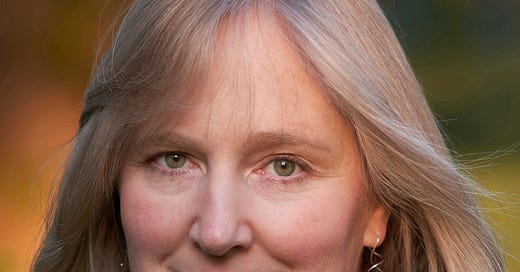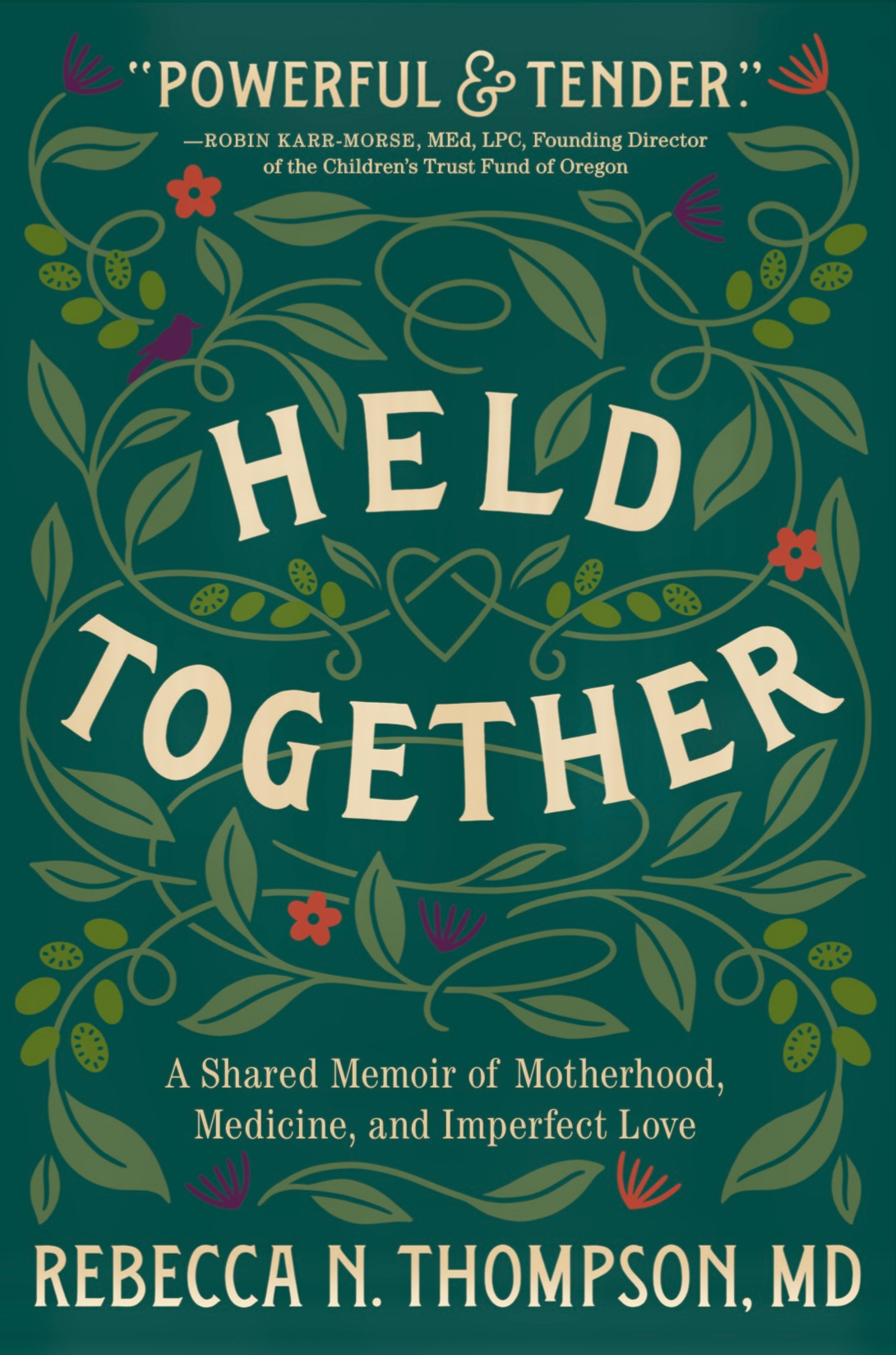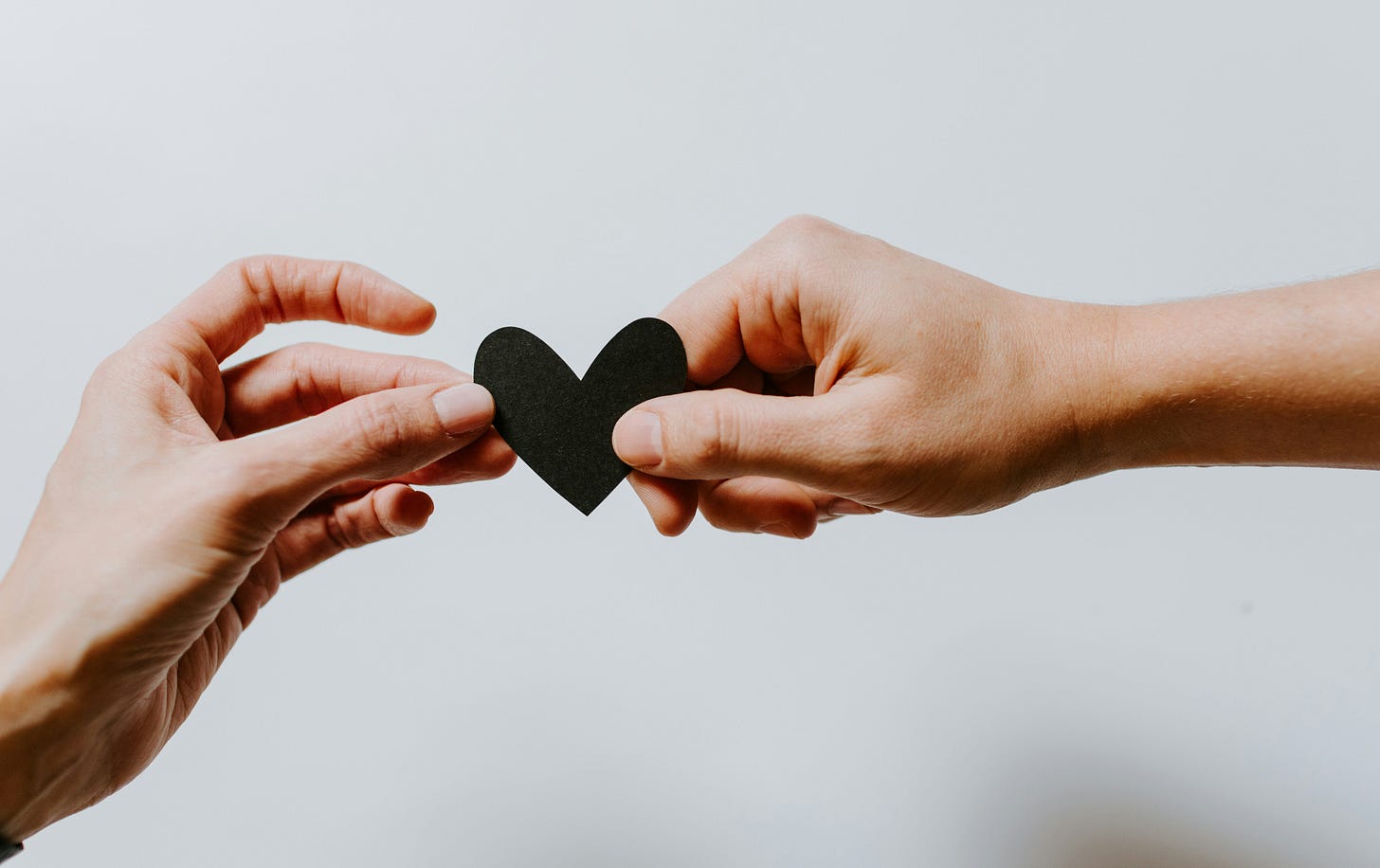The Miscarriage Dialogues: Dr. Rebecca N. Thompson on Miscarriage, Motherhood & Rethinking Maternal Care
Physician and author Dr. Rebecca N. Thompson shares her deeply personal journey through miscarriage, the hidden challenges of maternal healthcare and why listening is the key to healing.
For anyone who has experienced pregnancy loss, the silence surrounding it can feel suffocating. The statistics say miscarriage is common—one in four pregnancies end this way—but when you’re going through it, the loneliness, confusion and grief can make it feel like you’re the only one.
Rebecca N. Thompson, M.D., M.C.S., knows this feeling well. A family medicine and public health physician specializing in women’s and children’s health, Dr. Thompson had all the medical training and knowledge at her fingertips—yet when she went through her own devastating pregnancy losses, she found herself without a roadmap and without the support she truly needed.
That experience shaped not just her personal journey, but her career, advocacy and now, her writing. In her new book which comes out today, HELD TOGETHER: A Shared Memoir of Motherhood, Medicine, and Imperfect Love, she weaves her own deeply personal story with those of 21 other women, bringing to light the often-overlooked complexities of reproductive health, family-building and the resilience of motherhood in all of its forms.
Through her work, Dr. Thompson is determined to change the way we talk about miscarriage—not as an isolated event, but as a life-altering experience that deserves care, conversation and compassion. She explores the realities of pregnancy loss from both a patient and provider perspective, offering insights into what needs to change in maternal healthcare, how women can advocate for themselves and why embracing the "beauty in imperfection" is essential for healing.
In this powerful conversation, we dive into the inspiration behind HELD TOGETHER and why sharing stories matters, how her own pregnancy losses reshaped her approach to patient care, the systemic gaps in miscarriage support and how maternal healthcare must evolve, why fear after loss is natural—and how to move forward while honoring your grief.
For anyone who has felt unseen in their miscarriage experience, Dr. Thompson’s words are a reminder: you are not alone, your grief is valid and your story deserves to be told.
Read on for our full Q&A with Dr. Rebecca N. Thompson.
Your book weaves together your personal experience with pregnancy complications and the stories of twenty-one other women. What inspired you to write HELD TOGETHER, and what do you hope readers take away from it?
When I was just starting out as a young physician, my husband and I went through three complicated pregnancy losses, including two that were life threatening to me. In spite of all my medical training and experience, I felt lost. I was supposed to be an expert in health, but instead I just felt sad and discouraged and confused by the many ways that my body kept failing me, and I didn’t know anyone else who was going through anything similar.
Once I began to open up about my story—hesitantly, haltingly, gradually—I discovered I wasn’t alone at all. Many other women told me that they’d been through losses they hadn’t talked about, and almost everyone had something to share about their family’s complicated origin story or less-than-straightforward relationships. I understood that these individual connections could be the foundation for something much more far-reaching and inclusive, and I resolved to find a way to preserve these kinds of conversations in a way that would allow others to benefit from them too.
Over the past 10 years, I’ve worked directly and collaboratively with an amazing group of my patients, colleagues and friends, recording hundreds of hours of interviews, then weaving them into notes and letters and journal entries they’ve shared with me, retelling each story while striving to capture each authentic, individual voice and experience.
I hope every person who reads HELD TOGETHER feels the power of the universal in the specific: that when they read these stories—even about things that they could never imagine happening in their own lives—they come away understanding something new about themselves and their own families. I hope our stories spark a deep curiosity about the extraordinary moments hidden within ordinary lives. I hope we can inspire readers to believe that, no matter how difficult and complicated life may be sometimes, we can endure anything—especially when we support each other.
As a physician, you’ve spent years caring for patients, but your own high-risk pregnancy put you in the patient’s seat. How did that experience reshape your perspective on maternal healthcare?
Becoming a patient reshaped my perspective on every kind of healthcare. From the beginning, my path to medicine wasn’t exactly typical. I had been studying to become an archaeologist but—driven by my love of travel and adventure—I was also president of my college’s outing club, so I decided I should learn some first aid to be a more responsible backcountry trip leader. I was surprised by how much I enjoyed emergency medicine. I decided to start taking requirements toward medical school admission in spring of my senior year of college, then juggled a few more years of night school with day jobs to complete classes and entrance exams. All that to say that I think I had a broad and creative perspective on what healthcare could be from the time I committed to it.
But it was only in becoming somebody’s patient, in being cared for and cared about beyond technical competencies, that I came to comprehend the true privilege and meaning of being somebody’s doctor. During my pregnancy losses, I experienced being misdiagnosed, misunderstood, and repeatedly dismissed, and I wanted to prevent those painful situations for other people. But I also received incredible care from some deeply compassionate individuals—you’ll read specifically about my obstetrician, Devorah, as she appears throughout my story and then tells her own story—and I wanted to give back for the care they had given me. This led me to step down from my public health faculty position and start over in a second residency in family medicine, with a focus on women’s and children’s health.
Most importantly, being a patient was what ultimately taught me that listening is the core of healing, especially when caring for people in their most vulnerable moments of pregnancy and family building.
You talk about the “beauty in imperfection” when it comes to motherhood and family building. What does that mean to you, and why do you think it’s important for women to embrace this idea?
The only guarantee in life is that things will not always go as planned—and nowhere is this more true than in parenthood. I talk at one point in HELD TOGETHER about how navigating family life can feel like traveling through an unfamiliar landscape—we choose a route, we consult our maps, we set out on our way. But we never really know what the path will be like until we walk it. And we’re bound to encounter delays and obstacles as often as breathtaking vistas.
Though very few of the women I’ve worked with to create this project would have chosen their challenges, every single one of them believes that they wouldn’t be the strong and resilient people they are today if their lives had been simpler. For many of them, their families look nothing like the families they thought they’d have—and they wouldn’t want it any other way. Eriko’s story in particular, referencing the Japanese art of kintsugi and its tradition of repairing damaged objects with a line of golden lacquer, embodies the beauty in imperfection. She reveals the broken relationships and reproductive health failures that led to the complicated and loving family that she has now—the cracks that run through her story to bind her family together and to remind her of how they’ve all healed.
Embracing the beauty in imperfection means, to me, that we temper our expectations and loosen our grip on details we’ve been holding too tightly—not because everything happens for a reason, a premise that HELD TOGETHER soundly rejects, but because we know that we can make meaning out of whatever does happen.
Miscarriage is often met with silence or stigma. What have you learned through your work—and your own experiences—about how loss impacts women emotionally, physically and mentally?
Two things can be true: Miscarriage is incredibly common, and any kind of complication in reproductive health can have a life-altering impact on women and families, making them feel like they’re the only ones who’ve ever been through a struggle like this.
From a medical perspective, miscarriage is essentially a normal and expected event in reproductive life. About 20 percent of known pregnancies end in loss, and some studies have estimated that well over half of conceptions don’t lead to a live birth, with early miscarriages often written off as a delayed or heavy period. In the United States alone, more than one million miscarriages are documented every year. But because of the unnecessary silence and stigma that surround the workings of women’s bodies, miscarriage is still isolating for individuals in spite of being so incredibly common on a population level.
My experiences as a patient, and my training in family medicine, have taught me many practical things that have helped me take better care of others: How to interpret early pregnancy hormone levels and prenatal testing results in ways that take into account more than textbook data points. How to manage the complications within my scope of practice, and how to recognize when it’s time to refer to my expert colleagues. How to provide reassurance and validation, recognizing that sometimes a miscarriage is devastating, sometimes it’s a relief, and sometimes it’s both, or something in between. Above all, what I’ve learned through my experiences in different roles within the healthcare system is that the emotional, physical, and mental impacts of medical events are overlapping and intertwined. And every individual and family experiences loss differently.
You share stories of women navigating infertility, pregnancy loss and alternative paths to motherhood. What were some of the most powerful lessons you took away from them?
These stories were what first gave me hope that if my husband and I wanted to be parents, we would find a way. Listening to the story of an old friend, Shreya, was a pivotal moment for me, as she recounted her experiences with life-threatening illness, infertility, and international adoption just as I faced the bleakest point of my own complications. She didn’t define her challenges as shortcomings. She didn’t make apologies for needing help or for seeking an alternative path. She claimed her story for what it was: Not better, not worse. Not easier, not harder. Just hers. She helped me see that telling my own story—and choosing where it led next, when I could—might be a way to heal rather than just a way to revisit grief.
Looking back on what I still carry with me from these stories as a parent now, I think learning about how all sorts of families come to be, and about how they struggle and thrive and come together and fall apart, can help us be less attached to how we think things should be and instead accept things as they are—again circling back to the beauty in imperfection. This doesn’t mean that we don’t strive to make our lives and our children’s lives better—just that we relinquish some of that control, and get clarity on what really matters. And exploring the perspectives of others can make us more compassionate. In the best of worlds, being less attached to a single right way to do things extends to being less judgmental too, to admitting that we can’t really know what choices we’d make in a given situation until we’re facing it ourselves.
Many of our readers are struggling with the decision to try again after loss. What advice would you give to someone who wants to grow their family but is paralyzed by fear?
It’s okay to be afraid. Fear is just a sign that what we’re doing is meaningful and that the stakes are high. In Olivia’s chapter, we talk about how “So much of fear is simply love. Fear signals that we value something deeply enough that it would break our hearts to lose it.”
How much you allow your fear to influence your next steps depends on its source. Are you worried about the potential medical complications of another pregnancy or loss? The emotional distress it might bring? Its impact on other family members or important relationships? How much of your fear is coming from your own desires, and how much is rooted in the expectations of others? It’s normal to feel guarded when we’re facing something that has caused us to suffer in the past. But it’s also okay to try and fail, and then try again. Or not. And it’s okay to redefine success—including following alternative paths to parenthood.
However you decide to move forward, remember that there’s grief in the losses that could happen while trying again, and there’s grief in the losses that come from not trying at all. And—though I don’t know if this makes things better or worse!—working through fear as you first become a parent is good practice. Because parenthood through the years will have plenty of fear—and also plenty of love and care and annoyance and sadness and joy and loss and obligation and doubt and boredom and wonder. You’ll have to navigate it all. Respect the fear. Explore the fear. But don’t let it decide for you.
How can healthcare providers better support patients experiencing pregnancy loss or infertility? What shifts need to happen in maternal care to provide more compassionate, individualized treatment?
Compassionate, individualized treatment starts with recognizing individuals compassionately. As clinicians, we should try to keep in the front of our minds that every person has a unique and complicated story that shapes their interactions with us. We don’t usually get to know all of that story, but whatever parts we do know are a privilege, and those details should shape the way we approach their care.
When we start from a place of wanting to understand our patients’ perspectives and priorities, it’s not a big leap to realize that our role is to meet them where they are as their advocates and advisers. So hear their fears. Explore their goals. Don’t assume, or impose your own. Be humble and curious. Because, as clinicians, we may sit in a position of expertise—and we should leverage that expertise to help and support in any way we can—but ultimately each person needs to make their own choices, then live with the repercussions of those choices. Slowing the frenetic pace of modern life whenever possible—allowing for enough time and patience to really listen to each other—is a shift that benefits nearly everyone giving and receiving medical care in any specialty.
HELD TOGETHER highlights different paths to motherhood, including adoption, surrogacy, and fostering. What do you wish more people understood about these journeys?
There are so many ways of becoming a family. While some are more common than others, every way that families come together is valid and valuable. Building a family through adoption, surrogacy, or fostering isn’t a lesser option than building a family by going through pregnancy and giving birth yourself, and parents can love children who don’t share their genetics every bit as much as they love children who do. Biologic ties aren’t necessary—and sometimes they’re not even enough—to define our relationships or to make us meaningful to each other.
Still, it’s important to recognize that many people who pursue parenthood through these avenues have had fertility struggles, and grief for the loss of what they’d envisioned shouldn’t be discounted. Considering why these journeys may be more complicated than others—mentally, emotionally, logistically, financially—is helpful, especially for family and friends for whom family building has been more straightforward. And just like there’s not just one way to experience pregnancy, childbirth, or biological parenthood, there’s not one typical experience of adoption or surrogacy or fostering.
The children will have their own complex reactions to process too, especially as they get older and ask more questions about their family of origin. Moving a child from one family to another is neither charity nor rescue. Many of the people I’ve worked with in these relationships express deep discomfort with being seen as any kind of savior. They just want to be parents, acknowledging that every family is different from every other family, and this is only one part of their story.
There’s often an unspoken societal expectation that motherhood should look a certain way. How can we shift the conversation to be more inclusive of all paths to parenthood?
Truly, I think just learning about each other’s stories goes such a long way toward being more inclusive. Everyone whose story we share in HELD TOGETHER identifies as a mother, and the vast range of perspectives and experiences contained within just this one group of stories still amazes me every time I think about it. Maybe the key is in embracing the fact that every mother—even those who consider mother a large part of their identities—was her own person before having children, and is still very much her own person once she’s a parent too.
The mothers in HELD TOGETHER hold a wide range of jobs—physician, nurse, teacher, architect, hired maid, engineer, artist, and many more—and come from many different cultural, racial, religious, and socioeconomic backgrounds. They are partnered and single, widowed and divorced, gay and straight, city dwellers and homesteaders. Some have had limited opportunities for formal education while some hold multiple advanced degrees. They have lived all over the U.S. and have immigrated here from other countries. Their pregnancies took place from their mid-teens to their mid-forties, and their children range from newborns to 50-somethings who are mothers of young adults themselves.
And yet, for all their diversity, they are much more alike than they are different. They all love their kids. They want what’s best for their families. They’re trying to figure out what best even looks like while the ground beneath them is constantly shifting. It’s nearly impossible to come away from reading these kinds of stories and not see the common humanity—how the threads of building a life, raising children, and creating families can unite us all.
You write about “healing the healer” and the emotional toll of being both a doctor and a patient. What advice do you have for women who are trying to balance their own grief while advocating for others?
Sometimes advocating for others is precisely how we can process our own grief—by helping us get out of being mired in our own experiences alone, and allowing our struggles to serve a greater purpose.
After my third pregnancy loss, I had been thinking about undertaking a second residency, in family medicine, to get more training in obstetrics. But when I was suddenly offered the opportunity to start that training immediately, at the university where I’d been working for the past couple of years, I wasn’t sure what to say. It was exactly what I wanted, but the leap of faith was unimaginable. I’d be spending much of my time conducting prenatal visits and attending deliveries, surrounded by mothers and babies. I didn’t know how I would be able to cope with showing up for my patients each day if I kept getting pregnant again and having complications, or if I never got pregnant again.
What ultimately helped me make the decision in those short few days that the program gave me to respond was realizing that, while I couldn’t control whether I’d ever have a successful pregnancy, I could control whether I embraced this opportunity or let my fear limit me. I decided that using my experience to benefit others—finding meaning beyond how these losses impacted me as an individual, no matter how my story continued to unfold—might help me build myself back up against feeling broken. And that has proven absolutely true.
So to anyone dealing with their own grief while trying to support others, I’d say: Reach out to offer help even while still finding your way can replace feelings of helplessness with a sense of agency. The lines between healer and healed are much blurrier than we imagine. We can heal ourselves by healing each other.
What would you say to someone who has experienced pregnancy loss and is struggling to find hope?
There’s no rush. Hope will be there when you’re ready for it. But it’s okay not to feel hopeful all the time. Sit with the despondence, the resignation, the sadness, the regret—and absorb it all. What does it tell you about what you value, and how you might move forward? Don’t believe those who insist that you’re supposed to feel a certain way on a certain timeline. The stages of grief are real, but they’re rarely linear.
Lean on those around you. Don’t be afraid to ask for help. Sometimes the people we thought would be there for us aren’t able to be at the moment we most need them, and that’s probably more about what they’re going through, and how your story might bring up complicated feelings for them, than it is about you. But other people you never expected to be important in your life may step forward in ways you couldn’t have predicted.
Tell your story. When you open up, you’ll discover people all around you whose lives aren’t looking at all like they’d anticipated or hoped for. Take inspiration from each other. Mitra’s story—about womanhood and motherhood and teaching and faith—is the one I always come back to when I need to be reminded of the many ways we can support each other to impact the world for good, and how our influence can ripple through generations extending far beyond biological ties, even when our lives don’t end up as we’d planned.
There’s always hope, because we can always grow and change. One moment at a time, do the next right thing, then the next right thing, then the next. Know it’s okay for what you hope for to change over time. Give yourself grace.
For those who want to support a friend or loved one who has suffered a miscarriage, what’s the best way to show up for them?
It’s hard to generalize about the best way to help others who are dealing with miscarriage. You have to take into account so much history and context, including what you know about this person in other aspects of their life, how they felt about this pregnancy, and what other responsibilities they may be balancing with their physical recovery.
That said, from an emotional standpoint, I think the most thoughtful approach you can take is never to assume how they’re experiencing the situation. This may or may not have been a desired pregnancy. They may have a more complicated relationship with their partner, if they have a partner, than others realize. The way they understand their experience may be colored by events in their lives that you have absolutely no knowledge of, and that they may or may not want to disclose or discuss. Just conveying to them that you care, that you’re sorry they have to go through this, that you don’t know exactly what they’re feeling but that you’re available if they want to talk (if you really do feel up to that) or just sit together in silence—all of these simple expressions of support can mean a lot.
On a practical level, I personally prefer not to ask someone what I can do—because tasking them to find an assignment for me just adds one more thing to their to-do list—but to offer something specific that I think I might want in their situation: “I’m heading to the grocery store this afternoon. Can I drop off some basics or a ready-to-eat meal at your home around 3 o’clock?” “I have a free morning tomorrow. Could I bring you a coffee and run a load of laundry for you?” “I’d like to mail a care package for your kids, to give them something to do so you can get more rest. Do they still like sticker books and bracelet-making kits?”
And please—support them in declining invitations to baby showers, kid birthday parties, and other events like this for a while, unless they actively want to attend. Although some people find that celebrating other people’s families gives them hope about their own future children, many people feel terrible when surrounded by others who are excited about things that were part of the imagined future they’re grieving. Give them permission to protect themselves while they’re at their most vulnerable.
What conversations around miscarriage and maternal health are still missing from the mainstream? What do you hope to see change in the coming years?
Healthcare is healthcare. I wish our society wouldn’t draw such stark lines separating reproductive organs from the rest of our bodies. It’s hard enough to go through pregnancy losses and complications, and perpetuating silence around sensitive topics just makes taking care of our health fraught with unnecessary stigma. Without the care I received, at least three of my five pregnancies could have easily killed me. But the medical procedures and medications that saved my life and spared my fertility have been denied to many women in recent years and are currently illegal or unavailable in parts of our country. Some of these women have indeed died or been irreparably harmed, exactly as I would have if I’d happened to find myself living in a less fortunate geographic place or at a different moment in history. And it’s not getting any easier to access this care. I hope that we will be smart enough and strong enough as a society to reject the forces that want to move us backward and put people’s lives in danger. The same holds true for brain health, meaning mental health and neurological care. The health of the brain and the health of the body are inseparable.
To keep these conversations relevant and productive, we need to keep normalizing reproductive care and advocating for it to be accessible to all. Women are wise and resilient. We are fully capable of directing the course of our own lives, and we have every right to do so. Even when we endure difficult things—especially when we endure difficult things!—we should not be ashamed, and we should not be treated as objects of pity. We should be empowered to make decisions about our health—for all parts of our beings—in collaboration with our medical teams. This conversation is ongoing—but we need to keep it loud and visible, amplifying the stories of individuals and families in ways that give preservation of reproductive rights the attention it deserves.
As a doctor, mother, and now author, what’s next for you in your work as an advocate for women’s reproductive health?
I believe that true stories well told are our most powerful tools for creating empathy. Stories inspire us to be curious about and genuinely interested in perspectives beyond our own. So sharing the stories in HELD TOGETHER is my advocacy. This project, at its core, stands for the importance of humane treatment in medicine and the right of every individual to define who they are and what their story can mean.
To spread this message, I’m determined to reach as wide an audience as possible and will continue working toward this goal for as long as the opportunities to do so continue. This does require stepping far outside my comfort zone, because—as many other mothers and medical professionals will no doubt relate to—I’m much more used to working behind the scenes to support others, and don’t really enjoy seeking attention for myself. But every one of the women in HELD TOGETHER who has trusted me to help retell her story has challenged herself to do new, difficult, uncomfortable things. So I’ll take my inspiration from my incredible collaborators, and do it for them, and for all of our stories. This is how I can be an advocate as a doctor and as a writer.
As a mother, I also prioritize cultivating compassion in the next generation. In my own family, I try to raise my children to consider the perspectives of others and to think about how they can use their own powers for good. But more broadly I hope that HELD TOGETHER will inform future generations of medical professionals. My dream would be that our stories are read by every medical student, by every resident in training, and by every applicant to nursing and midwifery and psychology and social work and other healthcare programs, and that our stories would instill in them the desire to practice their craft with a more nuanced and thoughtful appreciation for the contexts of their patients’ lives.
Acknowledging that I can’t do everything, my work with HELD TOGETHER empowers me to do the something that I can. And maybe our stories can offer the world some extra compassion, a little skepticism, plenty of hope, some well-founded outrage and a whole lot of persistence along the way.
These conversations matter, and so does your voice.
If you have a story to share, an idea to pitch or just want to reach out, we’d love to hear from you. Email us at jenn@milaandjomedia.com or send us a DM at @miscarriagemovement.
Talking about miscarriage shouldn’t feel like a secret. Let’s keep pushing for change—together.








